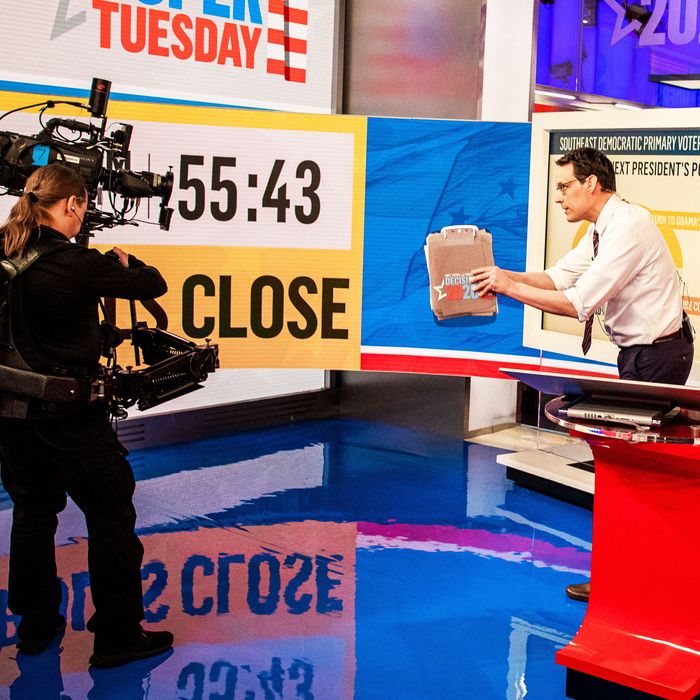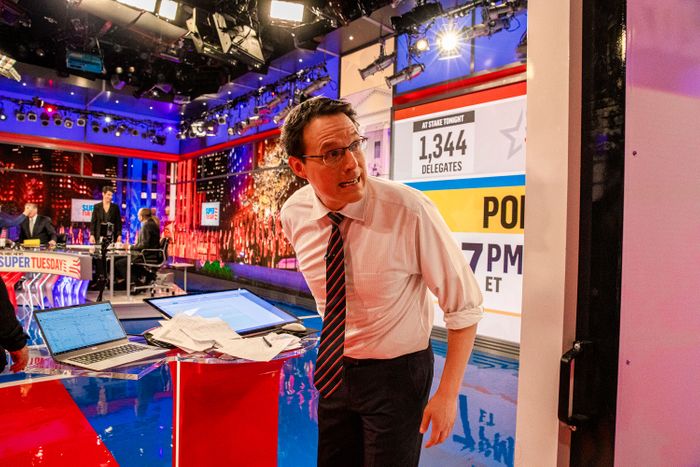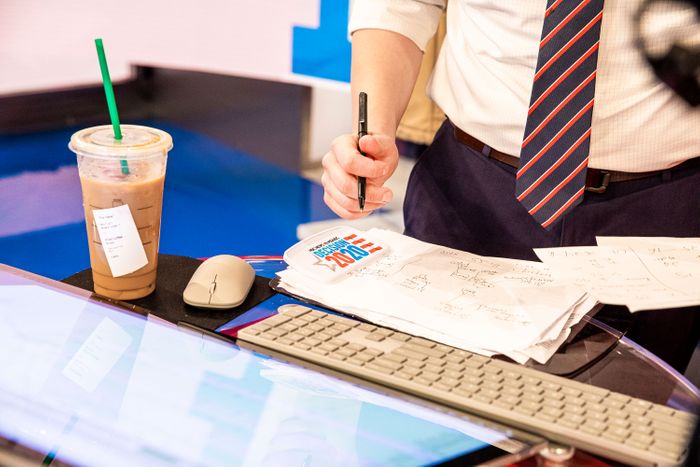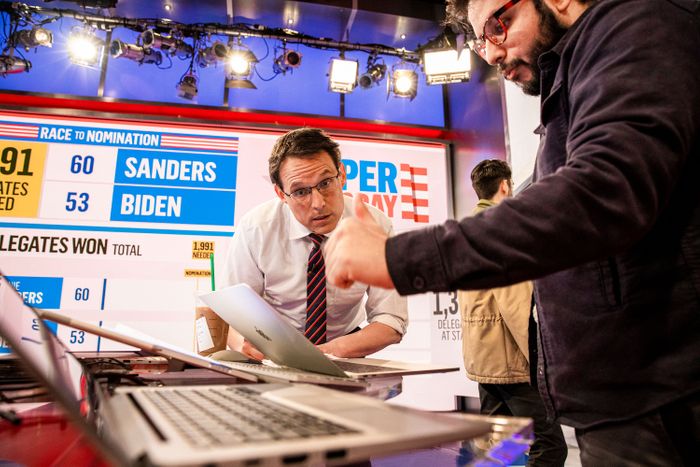
It is 4:59 p.m. on Super Tuesday and Steve Kornacki, MSNBC’s national political correspondent and trusted human calculator of votes, is peering at a laptop screen filled with freshly released exit polling data. These are only preliminary figures for the 14 states (and, lest we forget, American Samoa) holding Democratic primaries in this first week of March, but they already hint at several potential wins for Joe Biden and a striking tidal shift in the race that could position Biden, not Bernie Sanders, as the party’s front-runner.
Kornacki, his smile wide as his eyes scan the information, is clearly getting a charge out of this.
“Oh my God,” he says when he sees how well exit polls suggest Biden will do in Virginia.
Then he looks at exit figures in Oklahoma. “This is a landslide. Wow.”
Over the next eight hours, until shortly after 1 a.m. on non-super Wednesday, Kornacki will do what he’s excelled at doing for four election cycles since 2014: explain whether it’s a landslide (or not) with the energy and authoritativeness of a political wonk who’s just knocked back a couple of Red Bulls and has lost all sense of chill. Tonight, the 40-year-old, openly gay Massachusetts native will do that less than 24 hours after he was drafted to host Monday’s episode of Hardball, immediately following the resignation of MSNBC institution Chris Matthews.
Matthews stepped down unexpectedly on-air Monday after facing complaints about comments he made regarding Sanders, his handling of a post-debate interview with Elizabeth Warren, and a GQ piece that highlighted Matthews’s history of belittling women. After receiving a head’s up early in the day that he’d be asked to steer the rest of the hour, Kornacki, a frequent Hardball sub, delivered an emotional, extemporaneous tribute to Matthews at the beginning of the show, as well as another at the end of the program that he wrote 90 minutes before air time.
“It really got to me watching [Matthews’s sign off], and then I went out there and I had to say something for 20 seconds,” says Kornacki, who told producers beforehand that he wanted to ad lib his initial response and “react with everybody else and tell them, This is hitting you and it’s hitting me.” “Whatever I said on the air,” he added, “that was my raw reaction to what I had just seen.”
While visibly shaken, what he said, in part, was: “Chris Matthews is a giant. He’s a legend […] I know how much you meant to him and how much he meant to you.” As he does so effectively on election nights, Kornacki conveyed the sense that he was still processing what just happened along with the audience. Perhaps as a result, his name immediately trended on Twitter. At least one person expressed a desire to “buy poor Steve Kornacki a drink.”
The fact that he was asked to handle such a delicate situation while juggling everything that lay ahead on Super Tuesday — which turned out to be an 18-hour work day, save for one break from 2 to 4 p.m. when he took a walk to clear his head — speaks to the confidence the MSNBC higher-ups have in him, as well as his reputation as a reliable, unflagging presence in the studio.
During his post–Super Tuesday appearances on Wednesday, Stephanie Ruhle called him “a national treasure” in the 10 a.m. hour. At 11, Craig Melvin made him sound super-human: “He has not stopped. He has not eaten. He’s only been drinking water for the past 18 hours.” Of course, this was an exaggeration. On Super Tuesday night, I personally watched him drink two venti iced coffees from Starbucks, heavy on the milk (normally he mainlines Diet Coke, but he gave it up for Lent), and one whole slice of pizza.
Kornacki’s on-air persona is a mix of geek and guy-next-door, the everyman with a brain for political data. His fashion choices even make him look a little like a politician on the stump; without fail, he dresses in a tie and a button-down shirt with the sleeves rolled-up. (The pushed-up sleeves, he says, are “more of a convenience thing than anything else.”) If you watch him closely, you might notice his tics. The clipboard he’s always holding, for example, is a replacement for a rolled-up piece of paper, which had nothing written on it, that he previously used as an on-camera prop. “What do I do with my hands? I never really figured that out,” he says, “But I have the clipboard now and that helps.”
As relatably human as he is, he’s also a little bit machine. When he gets in his zone, as he did on Super Tuesday, he is laser-focused on absorbing data and calculating delegate counts, even during commercial breaks. On Tuesday night, when he wasn’t tapping on the 85-inch, interactive “big board” that can pull up the latest primary results in each state and parse them down to the smallest county, he was scribbling down numbers on pieces of paper that sometimes wind up on the floor, just out of camera-view. His Plexiglass-topped desk in front of the board houses a supersized iPad that displays the election data NBC receives from Edison Research; an old-school calculator that he uses to do quick math; and a laptop on which he maintains a spreadsheet of information that helps him determine which trends to keep an eye on as the evening progresses. (There’s also a Go-Pro attached to the table-top, which MSNBC activates when they want to include a picture-in-picture view of Kornacki at work. Sadly, it was only put to use briefly on Super Tuesday, well into the midnight hour.)
But more remarkable than Kornacki’s ability to do delegate count math on the big board with his index finger, is his capacity to recall information on a moment’s notice. When Rachel Maddow asked him shortly after midnight to share results from the San Antonio area, results that hadn’t yet fed into the board, he already had figures from the Bexar County website pulled up on his laptop, which he read while balancing said laptop in the crook of his left arm. He even pronounced Bexar — which sounds like bear — correctly, despite not being a Texan.
His knowledge of the geography and culture of the United States comes partly from his wonky passion. Two years ago, ahead of a 2018 special House election in Ohio, Kornacki spent his summer vacation in the greater Columbus area. “I took my dad with me,” he says. “I built in a trip to the NFL Hall of Fame, which is over in Canton. Then we spent two days driving around the 12th district of Ohio.” It also stems from his love of college basketball, which helped teach him about the make-up of the country. “I pay attention to two things in the world,” he says: politics and sports. “Following college sports as a kid, I’d be like: Clemson. Where the hell is Clemson?” he says. “By learning sports rivalries, you learn the regions and the culture of a state.”
Kornacki — who votes, but admits he hasn’t voted in every single midterm election — is among the candidates being mentioned in the press as a potential replacement for Matthews; he’ll almost certainly be part of the rotation of temporary hosts in the 7 p.m. Hardball slot in the coming weeks. He isn’t a particularly opinionated guy, though, which seems like a prerequisite for that job. “I don’t think my political opinions, to the extent I have them, are useful,” he says. He told me he generally doesn’t get into heated political discussions, even with friends or family.
“What is happening? Why is it happening? What does it mean going forward? That’s where my mind goes,” he says. If Kornacki has a super power, it’s that boyish glee about the raw data of democracy. At the very least, it gives him an energy most mortals have a hard time summoning. Around midnight, during a commercial break, I asked him how he was doing. “More of California’s coming in,” he said, referring to that state’s slowly trickling in results. His smile returned, but his eyes never left his spreadsheet. “I’m getting my second wind.”





